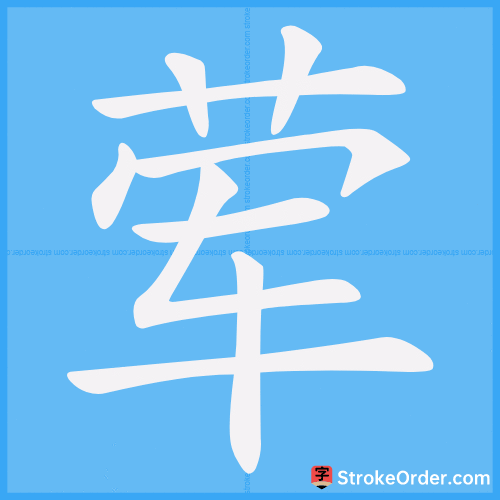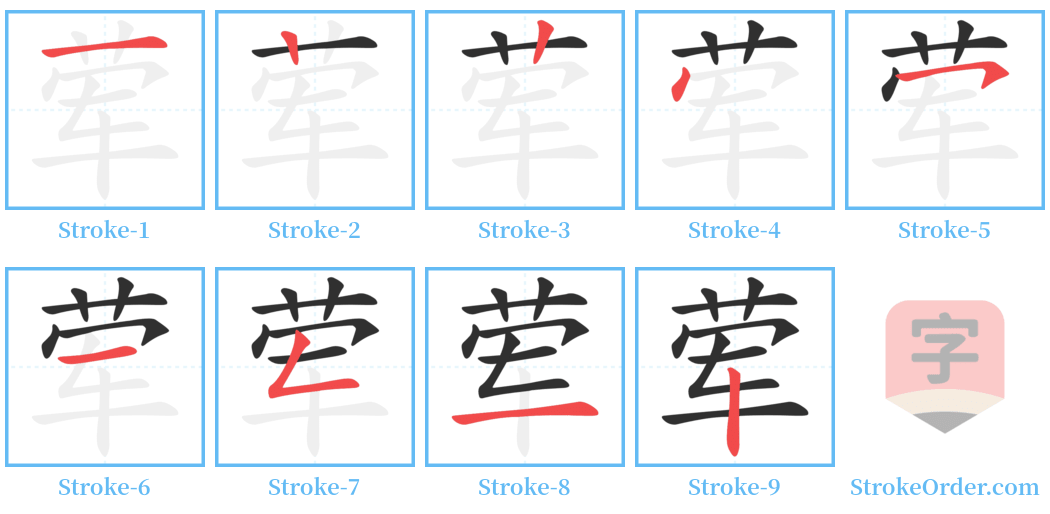荤 Stroke Order
Animated Stroke Order of 荤

Stroke Order Diagrams for 荤

Step-by-Step Handwriting Guide for 荤

Learn to Write Chinese Characters with Video Tutorials
Watch the video of writing the Chinese character "荤", learn the correct stroke order (笔顺) of the character "荤", and master the standard way of writing the character "荤".
Free Printable Handwriting Practice with Stroke Order: 荤
Printable Writing Practice Worksheet of "荤" in Portrait Orientation (Tian Zi Ge)

Printable Writing Practice Worksheet of "荤" in Landscape Orientation (Tian Zi Ge)

Information of 荤
Pinyin
hūn
Radical
艹
Strokes
9 strokes
Usage
★★★★★
Definition
meat dish
荤 hūn
1. Meat diet: Refers to food that consists of meat, fish, or similar substances. Commonly contrasted with "素" (sù, vegetarian diet).
2. In Buddhism, it refers to vegetables with strong odors like onions and garlic. For example, "五荤" (wǔ hūn, five acrid vegetables) generally includes onions, garlic, leeks, chives, and coriander, also known as "五辛" (wǔ xīn).
3. Refers to vulgar or low-level language. For instance, "这人说着说着就带上了荤字儿" (This person started to use vulgar language while speaking).
【Notes】:
- 【本义】: Refers to acrid and pungent vegetables like onion and garlic.
- 【引】:
1. "荤,臭菜也。" from Shuōwén Jiězì: Hūn refers to stinky vegetables.
2. "荤,辛菜也。" from Cāngjié Piān: Hūn refers to spicy vegetables.
3. "膳荤。" from Yílǐ: Hūn refers to certain spicy foods.
4. "膳于君有荤桃茢。" from Lǐjì: Hūn refers to spicy foods along with ginger and other vegetables.
5. "然后荤菜百蔬以泽量。" from Xúnzǐ: Referring to a variety of meat and vegetables.
6. "唯不饮酒、不茹荤者数月矣。" from Zhuāngzǐ: Referring to abstaining from meat and alcohol for several months.
【Examples】:
- 荤血 (hūn xuè): Refers to food like fish or meat.
- 荤膻 (hūn shān): Refers to flesh or strong-smelling meat; metaphorically implies something unclean.
- 荤臊 (hūn zāo): Refers to spicy vegetables and meat.
- 荤腥 (hūn xīng): Refers to strong-smelling meat and dishes.
4. 另见 (Also see) xūn.
Input Method for 荤
Pinyin
hun1
Wubi
aplj
Cangjie
tbkq
Zhengma
ewhe
Four Corner
44504
Unicode
U+8364
Same Pronunciation Characters